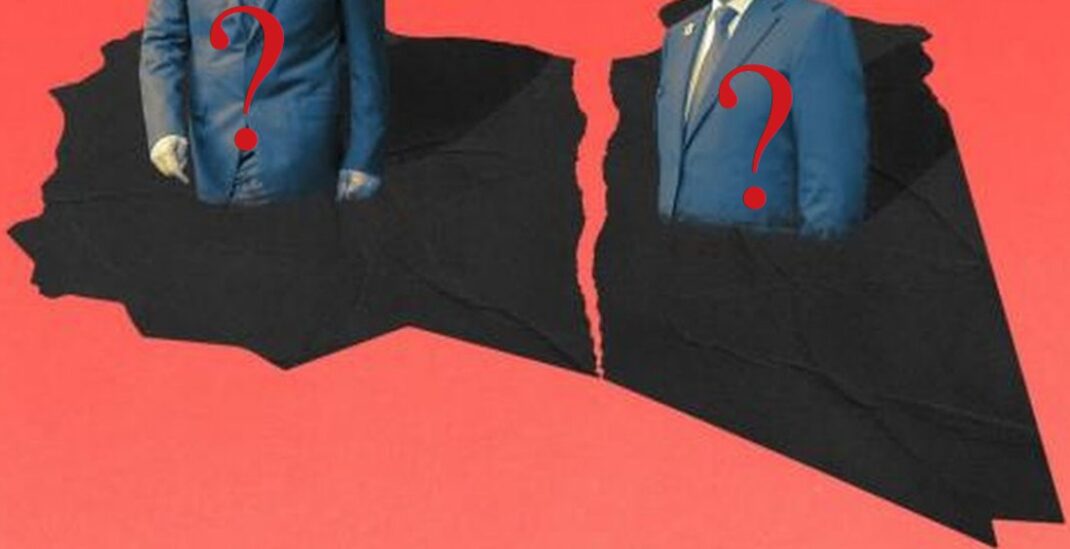By Anas El Gomati
 Strongman Khalifa Haftar has lost the initiative, and it looks as if the only option left for his international backers is to divide the country.
Strongman Khalifa Haftar has lost the initiative, and it looks as if the only option left for his international backers is to divide the country.
Libyan National Army (LNA) leader Khalifa Haftar’s 14-month offensive to capture the Libyan capital of Tripoli and unseat the U.N.-backed Government of National Accord (GNA) failed in June, and his forces lost territory that had taken him over six years to seize.
His defeat began when Russian mercenaries backing the LNA were seen abandoning the front lines, before Haftar’s entire rear line stretching from Tripoli to the city of Sirte suddenly collapsed.
Faced with outright military defeat, wavering international backers, and a political process in which he is no longer in the driver’s seat, Haftar’s future—and the future of Libya as a unified state—is now in serious doubt.
As Haftar began losing ground, his political behavior looked increasingly desperate, and his focus turned to his own political survival and relevance.
In a matter of weeks, Haftar staged a failed military coup over his political allies in eastern Libya and promised to launch the largest air campaign in Libyan history against the GNA, before abruptly backtracking and announcing his desire for a new, inclusive peace process and a return to political talks.
Behind Haftar’s erratic actions is a combination of international and local factors that have exposed his weakness and which could ultimately spell his demise.
For Haftar, the Tripoli campaign was supposed to be a swift ground operation to overthrow a weakened GNA that would end with him as Libya’s de facto leader.
As Haftar began losing ground, his political behavior looked increasingly desperate.
Instead, it dragged on for over 14 months, during which time the GNA’s position strengthened as it received military support from Turkey.
The operation became incredibly costly for Haftar’s military sponsors, who supplied thousands of tons of weapons, air defenses, and airstrikes without being able to gain ground.
The consequent total loss of military support from the United Arab Emirates and Russia swiftly ended his Tripoli adventure but also caused him to panic and turn against elected political allies in his own stronghold out of fear that they could sideline him in future negotiations with the GNA.
The loss of international support also exposed the fragmented nature of the LNA. Haftar never actually commanded a proper army, and he doesn’t even trust the troops he controls enough to ask them to fight on his behalf.
The LNA was initially established in 2014 using mostly tribal armed groups and separatists who were focused more on carving out local power—making it incredibly difficult for Haftar to exert his authority over them.
This stands in sharp contrast to his claim that he had spent years building a national professional army that could be mobilized and deployed across the country at will, which the progress of the Tripoli campaign ultimately revealed to be a farce.
By the end of the campaign, only Russian and Syrian mercenaries were found fighting on the front lines, and the bulk of Haftar’s forces had either disappeared or were still squabbling with each other in eastern Libya.
Even in the eastern part of the country (which is considered his stronghold), Haftar’s control is very fragile.
Elements of the LNA have already tried to overthrow him, and he previously arrested key commanders, had important tribal figures assassinated, and even faked his own death in 2018 to weed out disloyal commanders.
This basic lack of trust between Haftar and his army and his inability to conquer Tripoli with them convinced his international backers that their interests lay elsewhere.
Despite the waning influence of Haftar, neither the UAE, Russia, nor Egypt have abandoned their interests in Libya. After withdrawing from Tripoli, Russian mercenaries took control of Libya’s oil fields to block the GNA from resuming energy exports, and Moscow deployed 16 jets from Syria to an air base it now controls near Sirte.
The UAE also has used its covert air base in eastern Libya to launch drone strikes against the GNA’s forces advancing on Sirte, drawing a line in the sand to prevent further territorial losses.
And Egyptian President Abdel Fattah al-Sisi’s latest threat to deploy Egyptian ground forces into Libyan territory is perhaps the clearest sign that Haftar’s allies no longer trust him to lead military operations.
Sisi even hosted Libyan tribesmen in Cairo to give political cover to that decision. All three military powers have shown they are prepared to go at it alone, without Haftar. It appears that the best option for Haftar’s erstwhile backers is to partition the country.
Despite their efforts, however, the situation on the ground remains deadlocked. Washington has taken steps this week to de-escalate the situation and push for a start to negotiations, which could be the final nail in the coffin for Haftar as a dominant force in Libyan politics.
The GNA and Turkey have already refused to negotiate with Haftar, and now that he has lost all credibility, the UAE, Egypt, and Russia may be forced to back an alternative figure to represent the LNA in talks, such as Haftar’s political and tribal ally Aguila Saleh, the chief of Libya’s parliament who is close to the eastern tribal groups within the LNA.
But there are still no clear candidates for a replacement. Reports that Haftar is secretly depositing gold to the UAE and Switzerland out of concern that he will be sanctioned could suggest he has accepted this eventuality.
With Haftar gone and the military deadlock unlikely to be broken, it appears that the best option for his erstwhile backers is to partition the country.
The tribal and militia groups that form the substructure of the LNA already declared self-rule in 2013, so there is certainly an appetite for partition on the ground.
Since the United Nations established the GNA in 2016, eastern Libya has crept toward autonomy through the use of a parallel central bank that uses counterfeit Russian-printed currency, the creation of its own government, and even the formation of separate diplomatic relations with Bashar al-Assad’s regime in Syria.
More than that, Haftar’s former backers in the UAE have a track record of supporting separatist groups, namely in Yemen, so that option will certainly be at the forefront of Emirati policymakers’ minds.
Haftar’s defeat in Tripoli will open a new round of political uncertainty in Libya, and the goal posts appear to have shifted markedly.
Egypt, Russia, and the UAE are committed to retaining their foothold in the country, but their loss of confidence in Haftar means they have little hope of extending their influence over the entire country.
Peace talks await, but expect Haftar’s former allies to cut their losses and work toward partitioning off eastern Libya.
***
Anas El Gomati is the founder and director of the Sadeq Institute, the first public policy think tank established in Tripoli, Libya, in 2011.
___________





